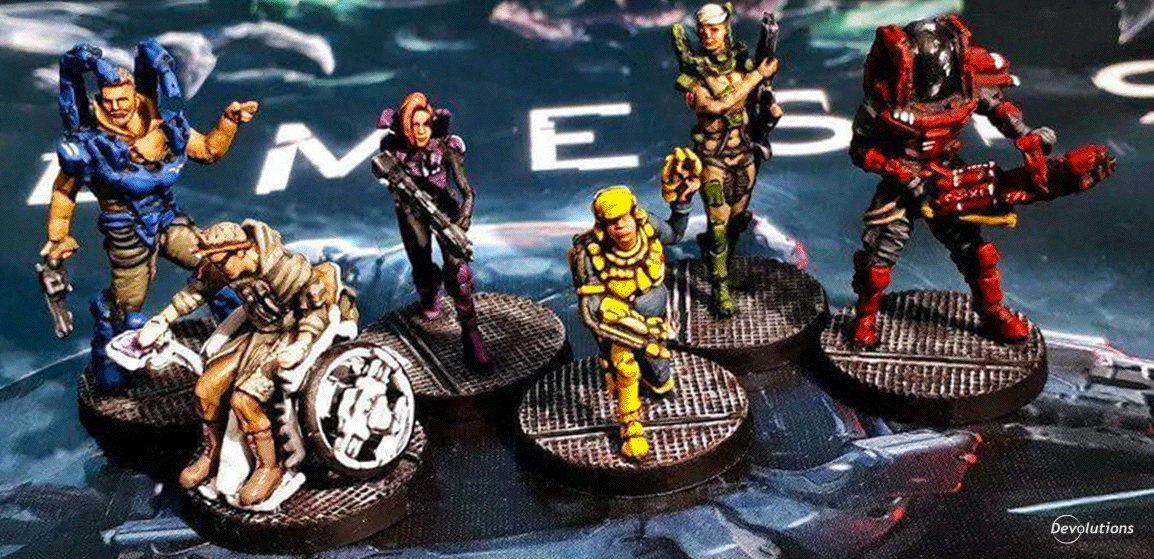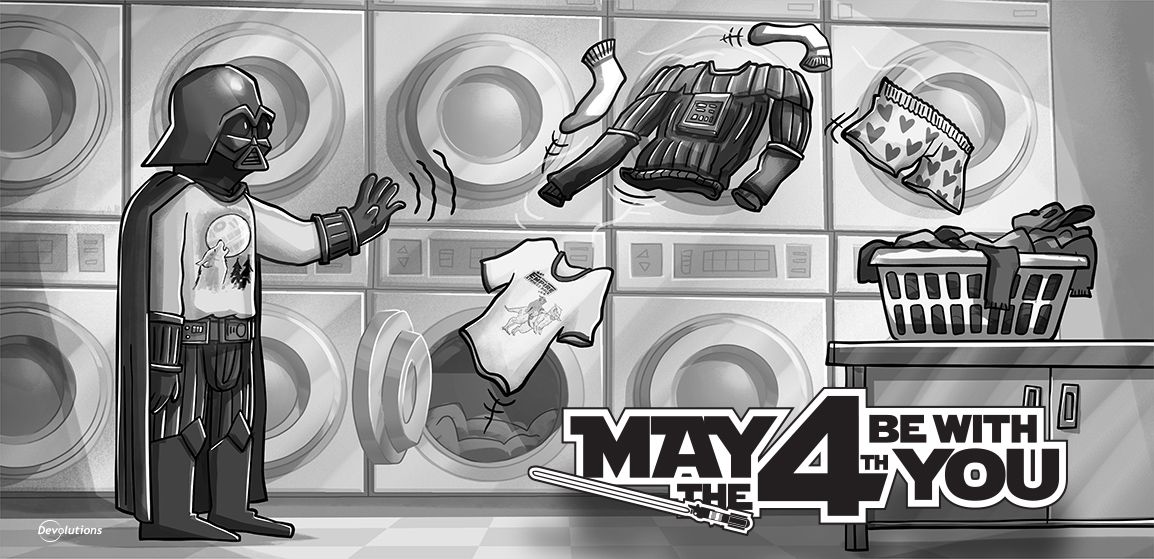I was thrilled to discover that there are a bunch of fellow board game fans here at Devolutions. In fact, if you come visit our headquarters, you’ll see shelves of games. Plus, after the work day many staff members head over to Randolph’s gaming pub, where we bond over a game or two. That’s just the Devolutions way.
A couple of years ago, Dérick published a list of 7 Must-Have Board Games for the Office. Today, I’m going to continue the tradition by sharing 10 recommended board games (and card games). Some of these are games that I own, and others are games that my co-workers own or have played.
Scythe
I loooooove this game. I’ve played this game many times, and highly recommend it to committed gamers. Keep in mind though that even without the expansion packs, Scythe is kind of pricey. Plus, it takes a few hours to really understand all of the details and nuances. But trust me, the money and effort are definitely worth it!
It’s an aesthetically pleasing game, with many components: beautiful figurines and cards, tactile resource tokens and coins, a huge playing board, and individual player mats.
Although the game has an element of competition (such as positional threats and one-on-one combat), it primarily focuses on developing each player’s personal strategy: it’s an engine-building game. Players make decisions that they believe will give them more rewarding and efficient power plays in the next turn.
Another great aspect of Scythe is that even while other players are taking their turn, there’s little downtime: waiting players must constantly analyze the board and their resources to plan their next action, which become more complex and dynamic as the game progresses. During the game, players conquer territory, enlist new recruits, reap resources, gain villagers, build structures, and activate powerful mechs to increase their wealth, military power, and popularity with the people — all of which are calculated at the end of the game to determine the winning player.
If you’re looking for a fast-moving game, then Scythe isn’t it. It’s more cerebral, deliberate, strategic and methodical. You could say that it’s a “quiet” game, but not in the boring sense — there is a lot of thinking and planning. A full game can take about 60-90 minutes, which is perfect for lazy Sunday afternoons with coffee or tea with friends or family.
Dominion
Dominion is a deck-building game that can be played by two or more people. In my experience, it’s the most fun when there are four or five players. I have the base game and one expansion pack, but my friends have gone all-in and have bought all the expansion packs! Dominion is one of those games that once you introduce it to your friends, they’re obsessed with it forever!
Gameplay is driven by three main types of cards: action cards, wealth cards, and victory cards (estates, duchies, and provinces). The action cards move the game along, and the wealth cards allow players to buy more action cards, more wealth, or victory cards. At the end of the game, the victory cards are the only cards that count: each card represents a number of points, which after being totaled, determine the winner of the game.
With this being said, a deck containing only victory cards won’t go very far in the game. In order to purchase more victory cards, players need to make strategic decisions each turn by choosing an action (or series of actions) that will be most profitable to them, and finish their turn with a purchase.
The more action cards a player has, the more complex their turns become. Why is this the case? Because often, action cards allow a player to carry out more potential actions that generate benefits. Examples include gaining more cards, gaining special dual cards (like action cards that also double as victory cards, and generating wealth bonuses that can be counted during the purchase phase of the turn.
If you’re in a competitive mood, then you can also use the dreaded (if you’re on the receiving end!) “curse card” against another player, which deducts a victory point from them at the end of the game. However, the main focus of the game is on one’s deck, not attacking other players’ decks.
Wingspan
Made by the same creators of Scythe, Wingspan is another engine-building board game divided into multiple rounds, with different objectives each round.
Wingspan is yet another aesthetically pleasing game, with beautiful cards featuring the world’s birds. Each player is an ornithologist (a person who studies or is an expert on birds), who must develop bird habitats (which can be activated for a benefit) that cultivate food and encourage egg-laying. The habitat is represented by a player mat, which is where gameplay takes place. Since each round has different objectives, players choose the birds they want to collect in alignment with that objective. The player who earns the most points within the bounds of the objective wins the round. And the player with the most points at the end of all four rounds wins the game.
Besides beautiful cards, this game also features a 3D birdhouse for shuffling dice (which represent food), and 75 miniature eggs that are fun to collect.
Nemesis
For an immersive sci-fi experience, Nemesis is THE game… it’s almost cinematic! Players are crew members aboard a ship infested with aliens. And these aren’t your wacky old Star Trek aliens. These are nasty, scary aliens who become stronger as the game progresses. In order to survive, players must learn to cooperate — while trusting no one. Most crew members never make it back to Earth alive.
If Nemesis sounds like a brutal game, then that’s because it is. Player fates are in the hands of random events and dice — not strategy. At first glance, that might seem kind of awful. But you know what? It’s surprisingly satisfying. It’s like participating in a movie that you can influence… somewhat. The bottom line? If you like great and immersive stories, then you’ll like (and probably love) Nemesis.
Star Realms
Star Realms is a deck-building game set in space, where opponents battle each other with spaceships. Throughout the game, the players grow their fleets by acquiring new ships and bases, and attack their opponent’s ships and bases. The game centers around combat: the player who reduces his opponent’s Authority from 50 to 0 wins the game.
Black Rose Wars
Taking place in a world of magic, Black Rose Wars combines deck-building, strategy, and combat — all of which are the vehicles for casting spells. Players are mages fighting to become the Supreme Magister of the Order. In order to ascend to this hallowed title, players must build a grimoire (deck) of spells which they will employ to complete objectives, damage other mages, destroy rooms, and more. Each of these will earn the players power (victory) points.
In my opinion, the pros of Black Rose Wars are the gorgeous visuals (I’m also and artist and as you can tell by now I’m really into aesthetics!), thematic content, and endless gameplay combos.
As for cons, the setup is pretty expansive, you need a lot of patience to learn all of the rules and details, and frankly there is some ambiguity in the rules (however, this is arguably not a total drawback since it allows players to have more influence over the gameplay vs. other games where the rules are very clear, standardized, and cannot be changed).
Hellapagos
If you think your friends would never betray you, then the creators of Hellapagos have some advice for you: think again!
In this unique and ultra-addictive game, you and your (so-called) friends are stranded on an island. The only way to escape is to work together and build a raft. Sounds like fun, huh? Well, it might be, if it weren’t for all of the insane politics and backstabbing that goes on. It’s jaw-dropping to play with people who you know have such a good heart and are paragons of virtue, but are utterly ruthless when it comes to winning the game.
The set-up is straightforward and simple. If you aren’t a board game geek and aren’t inspired by the idea of spending hours to learn how to play a game, then Hellapagos is for you. The learning curve is very gentle vs. steep.
Another fantastic aspect of this game is that you can play with up to 12 players, which makes it a perfect party game. Basically, the more players you have, the more fun it is (and the more backs there are to stab!).
Machi Koro
Machi Koro (which we call Minivilles in French) is a fast-paced game for two to four players. Each player needs to develop a city and complete all of the landmarks under construction faster than their rivals.
Gameplay is very simple: during his turn, a player rolls one or two dice. If the sum of the dice rolled matches the number of buildings that the player owns, they get the effect of that building. However, there is a nice twist: in some cases, opponents will also benefit from that same role.
With money in hand, a player can build a landmark or a new building, ideally adding to the wealth of their city on future turns. The first player to construct all of their landmarks wins.
Codenames
I’m including Codenames in the list because I realized that I had only mentioned one party game (Hellapagos). Honestly? Party games just aren’t my thing. But I did like playing Codenames at a friend’s house once upon a time.
Codenames is essentially about solving puzzles. The game is divided into red and blue. Each side has a team leader, whose goal is to lead their team to the final victory.
At the beginning of the game, there are 25 cards on the table with different words. Each card has a corresponding position, representing different colors.
Only the team leaders can see the color of the card. They then attempt to give their respective teams clever one-word clues to help them spot their agents in the field. The team that finds all of their cards (red or blue) wins the game.
Catan
I know what you’re thinking: Catan? Really? Is it even necessary to list this as a recommended board game? Doesn’t everyone know about Catan? The answers to your questions are: yes, yes, yes, and… yes!
Sure, many people are familiar with the game. But not everyone who knows the game has played it! And so, I wanted to mention this because it’s one of those games that really lives up to the hype. Plus, if you take it to a friend’s house, then there’s a good chance they already know the rules.
This family-friendly game encourages players to negotiate and strategize their economic growth as they develop their settlements around Catan’s recognizable honeycomb playing board. Admittedly, this game doesn’t have the enchantment of 3D-printed figurines, immersive stories, or complex engine-building of newer games. But it’s still a classic. And sometimes, the simpler, quicker games are the ones that we want to pull out after pizza with friends, instead of experience a 3-hour-long board game equivalent of a movie.
What Do You Think?
Are you a certified board game geek? Maybe you’re more of a casual player. Or perhaps you haven’t played a board game in many years. Well, regardless of whether you live and breathe board games or it’s been decades since you cracked open the ol’ box of Monopoly (pro tip: the railroads are very profitable!), I hope that you give some — or better yet, all — of these 10 recommended board games a try.
Please also share your recommendations and experiences! Are there some games that you love — and maybe others that didn’t live up to the hype? Please comment below. And remember, if you’re ever in our part of the world then stop by for some board game fun, Devolutions-style!





